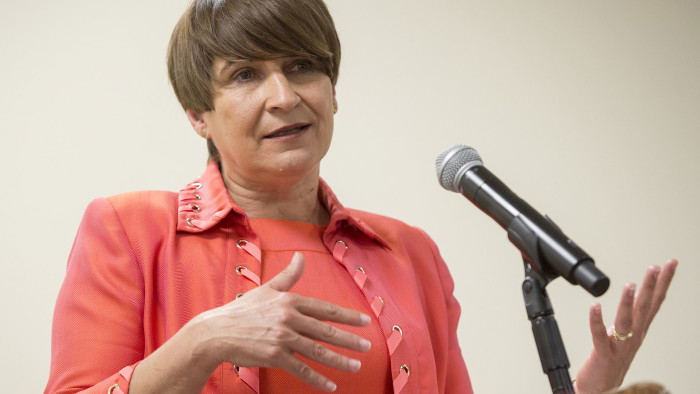Dutch minister Lilianne Ploumen: Why I stood up for adolescent girls

Roula Khalaf, Editor of the FT, selects her favourite stories in this weekly newsletter.
A woman’s body is hers and hers alone. That is a fundamental human right, whatever the consequences. To those who take a different view, I would say, let’s consider what would happen if women everywhere were unable to exercise their rights.
This road — in my view, a road to moral and material ruin — is exemplified by the reinstatement and expansion of the Mexico City policy, first announced in the Mexican capital by US president Ronald Reagan in 1984. In January, president Donald Trump decreed that foreign global health organisations that receive US funding cannot “perform or actively promote abortion as a method of family planning”.
Opponents call it “the global gag rule” — health organisations all over the world risk losing their funding if they so much as mention the option of safe abortion. The rule is detrimental to all forms of family planning, especially in developing countries.
The situation is paradoxical. The Mexico City policy is inspired by the views of anti-abortionists, but its effect will be to make the number of abortions go up, not down. The US spends $600m a year on family planning and sexual health programmes. The Guttmacher Institute, a sexual health and policy research body, calculates 3.1m abortions and 7.4m unintended pregnancies are averted with that money. Abolishing that funding simply means the same number of women will be faced with unwanted pregnancies, and many will have unsafe abortions.
This so-called “pro-life” policy will result in deaths on a massive scale. According to the World Health Organization, “deaths due to unsafe abortion remain close to 13 per cent of all maternal deaths”. Each decrease of $10m in US funding would result in 250 more maternal deaths, the Guttmacher Institute predicts.
By contrast, look at what can be achieved by investing in women’s rights. Women represent the largest source of untapped economic potential. The McKinsey Global Institute think-tank estimates that advancing women’s equality could add $12tn to global growth by 2025.
Closing the gender gap would be the smartest investment the world has ever made. Knowledge about sexual health and contraceptives helps prevent teenage pregnancy and its many consequences. Girls would not drop out of school — we know that each additional year of schooling increases girls’ future earnings by 10-20 per cent.
What is more, the benefits of modern contraceptives are incontestable. An estimated 214m women in developing countries would use contraceptives if they had them. Every dollar spent will yield $120 in return. Availability of birth control means, for instance, fewer teenage pregnancies and school dropouts, fewer abortions and maternal deaths, lower overall healthcare costs and more productive years for women.
Knowing all this, when I heard about the US policy shift I felt compelled to act, so I started the She Decides movement. The aim was to find alternative sources of funding and, so far, no fewer than 58 governments, from Denmark and Belgium to Nepal, Chad and Afghanistan, are supporting the initiative. Aided by philanthropic organisations, the private sector and citizens from around the world, $300m has been raised.
This is all the more heartening, given the moral and philosophical issues at stake. These regressive policies fly in the face of every notion of women’s independence and bodily integrity. They display a profound lack of respect for women, their health and their human rights. That mindset needs countering urgently. When women and girls have the knowledge and tools to make their own, informed decisions, they choose well. Statistics show open, liberal, non-stigmatising attitudes and policies lead to lower, not higher, rates of teenage pregnancy and abortion.
Take my country, the Netherlands. Our adolescent pregnancy rate is among the lowest in the world, as is our abortion rate. During their first sexual experience, 92 per cent of boys and 94 per cent of girls use modern contraception. To those who argue that liberal attitudes cause promiscuity: the average age for first sexual contact in the Netherlands is rising: half our young people do not have sex until they are almost 19 — and of their own volition, not because of religious or political pressure.
Effectively, the Mexico City policy withholds power from girls and women. Denying a girl or a woman information about family planning and sexual health means making decisions for her about her body and her life — decisions that should be hers and hers alone.
Lilianne Ploumen is the Dutch minister for foreign trade and development co-operation

Comments